Geof Huth's Blog, page 13
April 6, 2012
I DARE You
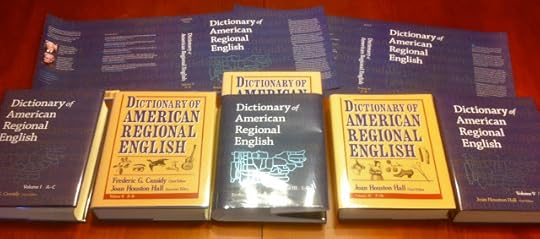 All Five Volumes of the Dictionary of American Regional English
All Five Volumes of the Dictionary of American Regional EnglishSo far, this year, I've appeared, in one form or another, in three books and in other places. Nothing of enough import to be significant, but significant enough to make me want to write about them. Eventually. But the problem is that I don't really want to do that until I've read the works I'm in (and one of the books, which arrived today, is about 550 pages long).
But another book arrived today: Volume V, the final volume, of the Dictionary of American Regional English, and so I'll write about it, because I am, somehow, somewhat, in it. My full name appears twice, and my surname alone, representing a book of mine, appears an additional time.
Maybe someday I'll write about these other books I'm in.
The Dictionary of American English is usually shortened to the acronym DARE, so that's how I'll refer to it. The book has been in development for more than a generation, and it's original chief editor, Frederic Cassidy, died along the way. The progress to Z has been slow, as these huge academic lexicographic projects always are.
I've been buying the books for decades now, the books not appearing until the project had been going on for years. What preceded the books were the "word wagons" (vehicles field workers drove to collect dialectical information, often the answers to the DARE survey, from the field), the cataloging of the data (on cards before they were kept in a database), and the laborious writing and editing of entries. Any dictionary project is large and difficult, but this one was made more so by the need to collect information on where a certain word, in a certain sense, was used geographically in the United States. The maps in DARE, which pinpoint the usage of particular senses of particular words, are one unique feature of this dictionary.
I've been using this dictionary for a generation, since a few years after I'd moved to New York State. I've used it in particular to look up words used in my family, including Pennsylvania Dutch words used in Nancy's family and transferred to ours. At some point, I began to collect all these words together, eventually producing a self-published 300-page dictionary of family words entitled Familiar Words. At some point, I wrote to Frederic Cassidy, sending him a copy of the book. He was along in years by that point, and I never heard back from him, but I heard back from Joan Houston Hall (I think), the current chief editor, who thanked me for the book.
Luckily, the folks at DARE took my advice and used the sources in my dictionary for some dialect words in my family. My dictionary was cited in two different entries in Volume IV, and I learned today that it was cited in one dictionary in Volume V. Maybe when DARE goes online next year, they will have incorporated more citations from my work in the earlier part of the alphabet.
I won't be remembered (if for anything) for these small appearances in this specialized dictionary about the English as she is actually spoken in American, in our cities and towns, in our forests and hills, but I'm glad to be part of this, for I believe in language, in what it does, in how it makes us human, on how it is poetry and commerce, vibrant live and necessary bureaucracy, all at once. How it is everything. Everything we are.
For the next week or so, I'll be at my house, and as I was preparing to get in my car and head out on an today, the UPS man drove up in his truck and waved at me to stop. So I stopped, went out to his truck, recognized him as the only UPS guy I've seen here for fifteen or so years, and signed for the box, realizing what it was. Receiving the book was like finishing the writing of a long book myself, a long and anxious wait was over.
Note that I held onto these books, even though I donated over 2,000 dictionaries to the University at Albany this past December. I had to own a complete set of DARE outright. I could not give up my first four. They were part of a very small number of dictionaries I decided I had to give. (I mourn losing any of these dictionaries, but these I could not give up at all. Not yet.)
Opening the box reminded me that this book was different from all the rest. Instead of a tax dust jacket, it had a deep-blue one that more resembled the hard cover beneath it. I did find it strange that The Belknap Press of Harvard University Press would change the dust jacket at the point the last volume was released. But I also knew that they were giving away (for free) matching dust jackets to the earlier volumes for those who needed them.
And a couple of days ago, a tube with those free dust jackets arrived here. I had no idea what the package was, forgetting that I had these dust jackets coming. (Instead, I was expecting a package from Ugly Duckling Presse, with copies of another book I'm in held within it, but that a story for another time. That book arrived today as well.) The display I put together above shows a couple of the old dustjackets, a couple of the old books double-jacketed with the new blue jacket on the outside, and Volume V, now the only book I have in the series that has but one dust jacket.
The middle book above (Volume III) shows the old dust jacket peeking out from under the new one, with two flat dust jackets resting above it.
The entry in DARE that cited my dictionary was the entry for the word "strubly," and all I can say is that it has been impossible for my hair to be strubly for many a—many a—year.
ecr. l'inf.
Published on April 06, 2012 20:49
April 2, 2012
Anyway
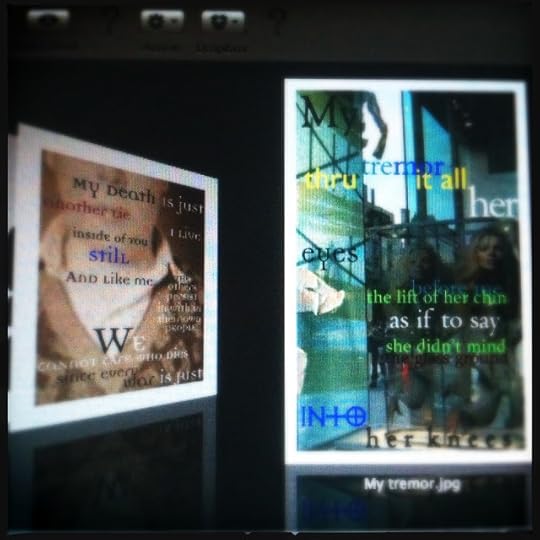
What I am reminded of, unexpectedly, is a poem of mine, one line long, that I wrote in the very early 1980s:
I have eaten the glass slipper, too tired to continue
Two and a half decades later, my friend Carole Parker repeated it to me, making this my longest-remembered poem (by someone other than me). I think about this today because I'm too tired for a regular posting, though I had planned one.
Tiredness reminds me of tiredness.
Somehow, though, I wrote a poem. Not for any purpose except that I had a few lines to do something with. Lines just come to me. I don't ask for them. But I feel a responsibility to do something with them, so here's what I did:
listen to 'Anyway if' on Audioboo
This has nothing with this being the cruellest month. (Elly spelling intentional.)
ecr. l'inf.
Published on April 02, 2012 20:59
April 1, 2012
The Heights to Which We Aspire
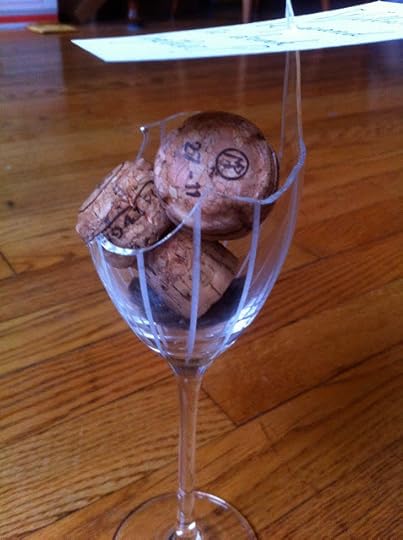
I broke a champagne flute yesterday. Kicked it over with my foot without ever seeing it and heard it shatter and scatter. It was empty, had no champagne, probably has never had any champagne in it. I'd been sipping a prosecco as I wrote. At first when I saw the damage, I knew I had to throw it away, but I decided to retain the biggest piece, so I washed it and rested it on the drying rack for an hour or so. After it had dried, I decided to make a poem out of it the next day. I rested two prosecco corks in its broken bowl and waited until today for an idea.
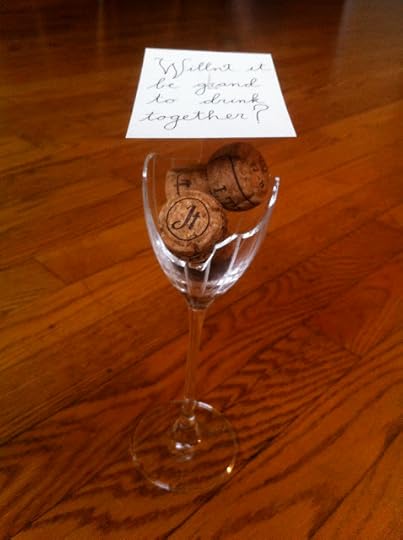
My basic idea was simple: I would leave two corks in its bowl (to represent the drink the flute usually held), and I would write something on a small piece of stiff paper and pierce it with the sharp spire of the flute to hold it aloft and in place. As I considered what to write, I forced the corks into the bowl to lodge them in place. I had forgotten that was a small piece of cracked glass still on the flute, and this flew off as I was working the corks into place. Afterwards, I lodged the corks in place, but the bottom of the bowl seemed empty, so when I spied a jar of tiny shark's teeth I decided to fill the bottom of the bowl with them. The sharp little teeth echoed the sharp spire of the broken flute.

With no idea of where to go with this, I wrote a majuscule W, giving its own bowls a jagged look reminiscent of the jagged spire rising up out of the bowl of the flute. I ended the W with "illn't," thus making a word that might appear to be good and regular English but which is totally unidiomatic, and I ended with the rest of a question about having a drink, making this an ironic little poem, an object poem, or not a poem at all. Whoever knows what anything is?
ecr. l'inf.
Published on April 01, 2012 18:12
March 31, 2012
The Family Doesn't Need a Poet
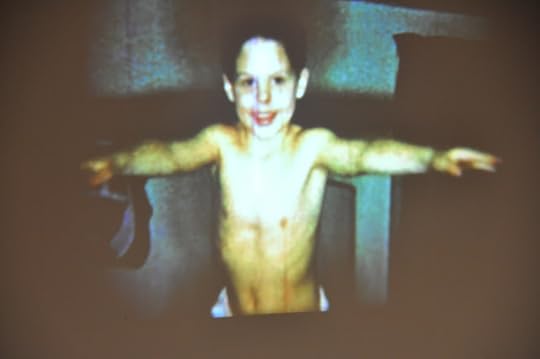 "And I Fly": Geof Huth's Photograph of Don Huth's Film of Geoff Huth (1 January 1965 and 24 March 2012)
"And I Fly": Geof Huth's Photograph of Don Huth's Film of Geoff Huth (1 January 1965 and 24 March 2012)1. Presqu'après-mid-nuit
The image is of me, age four, on the first day of the year 1965. I am in diapers because my parents made all of into personifications of a newborn year, complete with diapers. Before this point in the film, I was crabby, unhappy to have been awoken at midnight for the entertainment of my parents. Eventually, though, I acclimated to the new year. I took off.
The film itself was one of many converted to a digital format and projected on a screen throughout the evening of my father's 75th birthday party, celebrated in his current place of residence: Hendersonville, Tennessee. I retired to one of my many former homes, but one of the most significant of them, to celebrate three quarters of a century of my father's life, with one of my two brothers, all of my sisters, my children, my neiphews, and assorted other friends and family, in the Bluegrass Yacht & Country Club.
But I had arrived two days before, so the story is a little longer than that.
2. Auto-da-biogra-fé
On the flight to Nashville, where we all once lived and the center around which my father and siblings all revolve, I continued my reading of The Journals of Spalding Gray, which was a nearly constant harrowing account of the life of this actor, writer, and (most famously) monologist. On my return flights, I read the read of the book, completing it during the twenty-minute descent into Albany. That book, thus, infests my already fading memories of last weekend in Tennessee, its darkness suffuses my thoughts still. Once you know the end of the story is dark, you cannot have any hope, and I began Gray's book knowing the outcome. Still, details matter, and most darkness can deepen, so I still felt the hard wrench of the vortex sucking away the light, still felt the tourniquet tighten.
I've been reading autobiography recently, captured by the thought that a life well told, a life revealed, might provide insights into the human condition, might even seem more relevant to a poet than poetry would. I read the shortest of these autobiographies, Philip Schultz' My Dyslexia, first, finding it imperfect yet remarkably moving and surprising. The last point is the hardest to understand, for how could I find the story of someone I didn't know, had never heard of before, surprising? We learn about people quickly, Schultz presented himself quickly, and then he revealed his past, and the boy he was seemed an impossible source for the man he became. This poet's continuing struggle with dyslexia shocked me because it was so painfully human but also because the thought of being wounded by dyslexia seems so incapacitating to me. If it were possible to slip into dyslexia, that might be the worst fate I could imagine, for myself.
Today, I began reading Joan Didion's Blue Nights today, while washing my clothes in a laundromat nearby. The book is the story of the death of her daughter Quintana, a fairly horrifying followup to her book, The Year of Magical Thinking, which records the death of her husband and the severe illness of her daughter that led later to her death. Among all of this dying in her life, Didion struggles through her own serious medical problems. I've always loved Didion, whose prose is poetic, whose details are exact, whose humanity (her sadness, her strength, her frailty, her compassion, her resilience) is always evident. Her books of essays, Slouching towards Bethlehem and The White Album, remain favorite books of mine. And she's a native Californian transplanted to New York, as I am, even if her route here was much more direct than mine. She also married a man who was Catholic to baptize their daughter himself rather than wait too long to protect her from Limbo. At least in original intent, I was Catholic myself, and I'll never replace the penumbra of that faith system for another. I'll carry the scent of frankincense in my nostrils and the clinking of the thurible with me until I die.
Didion's chapters are short. She tells her story quickly, and although she has revealed the end of the story and the broad contours of the story that took her to that death I know none of the details yet. She understands le plaisir du texte. She knows to keep some secrets from me, at least for now. At this point, the story has a gentle cyanosis to it. The blue is seeping in slowly, just as the blue reveals itself slowly in the skin when the body grasps for oxygen but cannot draw any in.
The tourniquet tightens.
Gray tells a different story, still in fragments and flashes, but one decidedly linear and daily, one from a man so focused on himself, a man laid so bare and flawed that we cannot come to love him, but we want to come to save him. Everyone is broken by life, by family, by circumstance, but some are so broken that they barely function, even if they succeed in their life. Gray was, himself, death-loving, death-fearing, faithless, polymorphously perverse, egocentric, indecisive, fretful, and unfocused most of his life. He hurt terribly the three most important loves of his life, and he seemed generally uninterested in improving his behavior, in helping to repair these broken partners of his, even though he bore the responsibility for the breaking. His life was a swirling mess, and he let the suction spin him in circles as it pulled him down. Life as a trainwreck presented as a recurring diurnal nightmare of his own creation.
Almost his entire life was, except for that beautiful and extended moment when he had a family (most of whom, ironically, he had wanted to abort). Finally, this crazed self-centered man was something better than himself. That interlude reminded me of the idyllic picnic sequence in the film Bonnie and Clyde, a short respite before the return to the trip of death. And that final trip was amazingly harrowing. Gray became erratic and psychotic. His writing became obsessively repetitive (reminding me of Christopher Smart's Jubilate Agno). He recorded conversations and screeds rather than write words down. He presented examples of what Didion's identifies as Karl Menninger's concept of the apparent inadequacy of the precipitating event.
Note that whatever is precipitated need not even be mentioned. As with the word for "bear" in ancient Germanic Europe, it is a concept too terrible to be associated with it its actual name.
In a couple of weeks, I will read the second volume of Susan Sontag's journals, again (I assume) edited by her son. The first volume proved what a towering intellect she was, and what a shuddering mass of human inability to function. I haven't even read that book yet, and still I feel its effects.
I feel the weight of human inadequacy and failure, the dead weight of despair and the occasional lift of success, in these stories. I accept how melancholy can be regenerative, how there is some beauty in sadness, if we can just control it, accept what it teaches us, and build something out of it.
These stories are trapped in my body. Like blood. Circulating through me.
3. Thirstday
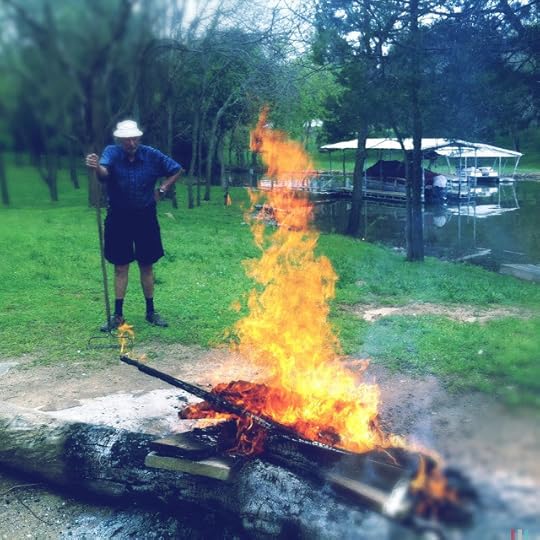 My Father with His Fire (22 March 2012)
My Father with His Fire (22 March 2012)I arrived in Nashville the day before my father's 75th birthday and two days before his birthday. My youngest sister, whom I'm the closest to of my five siblings, picked me up at the airport and took me to her McMansion of a home. Her daughter's bedroom is the size of the place I live. Her rumpus room is about five or six times the size of where I live. She says they don't use it very much. Beneath its 20-foot peaked 20-foot ceiling rest eight recliners, a wet bar, a large TV, and a bathroom about the size of my bathroom. While I was there, I was reminded how my family, which stayed behind in Tennessee, evolved in a different direction than I did. They became much more materialistic. (Most live in McMansions.) I became only more the intellectual. (My excess focuses on books and the experiencing of art.) I like my sister enough not to tease her too much.
She went off on errands, so I borrowed a car to make the longish trek to my father's house, made a little difficult by the fact that the area around Davidson County, Tennessee, had expanded exponentially in the thirty years since I'd left. I could drive for miles without recognizing anything at all, except for the greater number of redcedars, hackberries, and box elders. I couldn't see any osage oranges on the drive.
I found my father at home, the house he shared with my brother's family, and which was being remodeled, expanded actually, because it's difficult to have a big enough house. My father's apartment in the house remained unchanged, but the livingroom and master bedroom of the main part of the house was growing. And my almost 75-year-old father was preparing to do yardwork. In a house with three men 50 and below, I thought it a little ridiculous that my father, at his age even if capable of the work, was the only one ever doing yardwork, so I helped him carry the refuse from the construction down to a bit of exposed bedrock where he could burn it all: boards, boxes, logs, branches.
My father and I are not close, and haven't been for most, if not all, of my life, but in this case we were able to work together, to focus on a job, to avoid discussions of politics and of my baldness and the fact that he cannot admit he is exactly as bald as I am. It was enjoyable enough, though the fire was hot enough to cause burns four feet from it. But rain came in the afternoon, a regular occurrence in Tennessee, especially in the summer, so we retreated indoors, where we examined family photographs I had scanned and I asked him questions about his life for a little chronology I was finishing.
For dinner, we went out with a second cousin I had never met, and we discussed beverages (why I'm the only person who drinks scotch, I'll never understand), politics (where I was the liberal and my father the arch-conservative explaining that the US has the best healthcare in the world, as long as you could afford it, as if not affording it was not an issue). That reminded me too much of the father I knew. As did one other thing: He complained about the length of the epithalamium I read at my daughter's wedding, intimating that I shouldn't read a poem at his party. I told him not to worry, that I would not be speaking at his 75th-birthday party the next day.
This exchange reminded me of when I was in college, and he told me, "The Family Doesn't Need a Poet." Fortunately, I never considered myself the family poet, but I did wonder, eventually, if the family needed a union president (since my father hates unions), a consultant who told people how to organize their homes, a teacher (since he considers teachers little more than union members), a nurse anesthetist, or a pizza delivery man. I'm certain he never told them the family didn't need such people either.
4. Eine-Kleine-Blaue-Nacht
I finished Didion's Blue Nights today. A slim book, it's an easy read. At least one of the chapters was under two pages long, and Didion's writing was weakening a little. The book wandered, though maybe not as much as this essay, and many of her paragraphs were a single sentence, even a single line long. She left out details about her daughter that I'd expected her to tell us, possibly because they were too painful to recall or maybe because she'd covered the illness in The Year of Magical Thinking. Regardless the reason, the book was lacking. It opened strongly but it declined with time, just as Didion herself is declining personally.
After an opening focus on her daughter and the travails and horrors of parenthood (What if my child dies?), she began to focus on her sharp physical decline. She is not the 75-year-old my father is. This story was interesting enough to hear, but it pushed us off the track, pushed us to another realm. Still, the person of Joan Didion is both herself alone and the mother of Quintana, so she is the intersection of the book, and part of her story made me think of parents and parenting, something I've been considering recently, something that my trip to Tennessee made me consider.
First, a thought: To be a parent is to be a failure. I believe I've been a good father, that my wife has been a good mother, that we raised our children well, but what do I know? I was going to talk to my daughter about this very subject this week, but after five days and three reminders for her to call me I don't think that's going to happen, which has to make me reconsider my parentness. Still, I think I can conclude I was better at parenting than my parents, maybe because I was the eldest of six children (and they were nothing of the sort), and maybe because I always have seen myself as a caregiver. I was never born to be a poet, of that I'm sure, but I may have been born to be a parent. My children certainly did well in school, were generally well adjusted, and never were in any trouble, and never were any trouble to us. I know of no other parents who can say that of all their children.
But the real issue with being a parent is the facing of death. The small issue here, one that rarely passes through my mind, is that my children are my replacements on earth. I will desist from living, and they will remain, maybe even with children of their own, to continue. We die as people but not as genetic code. We pass that one. Facing one's own death, however, is easy. Facing the death of one's child is hard, and it begins at their birth. From that moment, you worry about keeping them living, at least most of us do. I always remember this: that my mother let me play outside alone, unwatched, in a concrete world with metal steps, even when I was two years old. Because of this Katy Burton pushed me down the stairs during her birthday party, which I was trying to crash at age two and a half. The tumble down those stairs broke my nose, so I can breathe only somewhat through my nose fifty years later.
Think of this, though, something that Didion's book made me consider: a reason that infants sometimes die near birth, an explanation proffered, is that they "failed to thrive." I thought of that for a moment today and then realized that that is the parent's other worry, a worry as pressing as death. Even after infanthood, our children must thrive. They cannot merely live or survive; they must make something out of this world, and it is our job to make it so.
No wonder to be a parent is to be a failure. How many of us are capable of even ensuring that we ourselves thrive?
5. Somnamanuensis
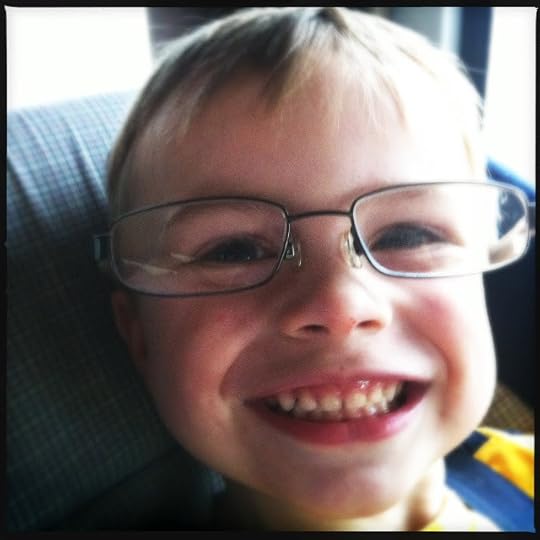 My Youngest Nephew Wearing Someone Else's Eyeglasses
My Youngest Nephew Wearing Someone Else's EyeglassesOn my father's birthday, I worked most of the day on the chronology of my father's life, finishing it only after it had made it to 44 pages of length. The delay was caused by fact-checking, even though I made sure not to check every fact, and by the fact that my father was feeding me, remotely (via email), additional facts, details on some of the long trips we took when we were young. These were huge trips, which sometimes required us to miss school and which took us, usually, to many countries at a time. The trips lasted from a month to two and a half months, and the longest took us from Bolivia to California to Washington, D.C., to Ghana. No matter what the drawbacks were of my childhood, I have had experiences very few people have ever been privileged to have. I know that.
There was one chaotic family outing on this day, which was the 23rd of March and thus my father's 75th birthday. The entire family, except for my children (who were still flying to Nashville), met at a truly terrible Chinese buffet in Hendersonville, and we ate in a little corner at about six tables. The attendees included all my blood nieces and nephews, all my siblings (except for the youngest), my father, two in-laws, my second cousin, and his mother, my first cousin once removed (so my mother's cousin). The food was worse than terrible, the space was crowded and sticky, and there was virtually no real conversation. I spoke mostly to my neiphews, which was fine with me.
What I couldn't understand, however, was that this is where my father and siblings (and associated children) meet for dinner almost every Friday night when my father is in town. I can't imagine anyone ever returning to this restaurant. Anyway, when my youngest sister asked me when I might return to Tennessee, I said, "Probably the early 2020s," and I wasn't kidding.
Afterwards, the family moved to my middle sister's home for drinks and talking, and there I had the chance to see my own beautiful children, whom I do not see enough, all three of them, even my son-in-law. This part of the visit back to Tennessee, one of my scores of homes spread across the world, was the best one. For a few minutes, I had a good time with a couple of my siblings besides my youngest sister. We were laughing, especially my brother and me, about the dangerous lives we lived as children and adolescents, and those memories were good, even though they started with the story of his knife wound on the head on the Barbados campus of the University of the British West Indies.
Back at my youngest sister's house, her son, my youngest nephew,wanted to sleep with me (he doesn't like going to sleep, being three and all), so my sister asked if he could sleep with me. He is an adorable child, strikingly verbal for three years old, so he's fun to talk to. After preparing for bed, he said he wanted to watch TV. He had some video in mind, but I said I'd tell him stories instead. So I told him a Gate Wilder Squid story, one of the series of stories I told my own children at bedtimes, ones I invented at bedtime. To adults, they can be seen as horrifying metaphysical stories about the possibility that there is nothingness except for our imagining there is something. But children like them. I've no idea why. Gate Wilder Squid is a cat. Maybe that is all it is. After telling him the one about how Gate Wilder Squid was born and then went back and forth into a parallel world until he wasn't sure if he'd ever returned home, he wanted another. So I told him the story about Gate Wilder searching for asparagus root, hearing a noise in a tree, climbing the tree, finding a button, and then pushing the button causing everything on the planet to disappear into the earth. At that point he decided he could fall asleep.
I haven't slept in bed with anyone in over half a year, so it was good to have someone close, someone I could hear breathing, even if it was a little boy who would twitch and kick the covers from time to time, waking me up, Somehow, he was able to do this without ever touching me, so I would fall right back to sleep. I was calmed just by his presence. This one little beautiful and extended moment with my nephew, one which consisted almost entirely of our sleeping, seems to me the Bonnie and Clyde picnic sequence of this trip.
If I have to die anyway, allow me a tiny bit of respite on the way.
6. Gray-Day
Spalding Gray has inhabited me for a week.
I am sure I never would have liked the man. He was immature, hurtful, self-centered. I've made one of these lists already, so I need not continue it.
But I also saw in him reflections of myself, and anti-reflections. No way am I the sexual being he is. I am a bit more particular sexually than he is. But I worry that my attempts at art, even say this one I am writing at this moment, are self-centered, because all autobiography is, and thus without extended value. Even if I am not like Gray in that way, even if my focus on the self is no greater than usual, people may see it otherwise. I am relatively open about my life, so I write about it to explain the world.
It may seem that the world is small and encompasses only me, but I believe that autobiography offers others insight as well, and offers other insights.
Still, I identified with Gray. He was always questioning what he was doing, never certain he could do anything well. He focused on the idea of art being life, and life being art. So his journals were simply source material for the monologs that made him famous. He became famous for telling his life, and all that saves me from his fate is that I don't have as much to confess as he does. (I pity the women he loved who had to listen to his life being told in public, a life that often affected them negatively, and I wonder if I should pity any women I have loved as well.) This blog, of course, is just the most obvious example of how I've made my life my art. We are one. It is all of a piece.
That's what I always say: It's all of a piece. All of existence is just one thing. Every tiny thing we ever experience still fits within it. In its proper place.
Gray was an actor, so he also talks of the body as art, as the work, as the venue in which art occurs. And that resonates with me because I am interested in what I call full-body poetics, in a poetry that is about the tongue speaking, the body moving, about performing the poem with one's full self: intellectual, physical, emotional.
7. Gesamt-once-worst
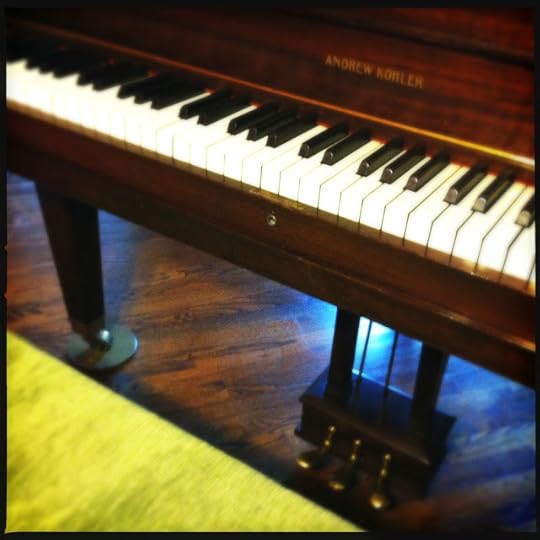 My Grandmother's Piano in My Sister's House
My Grandmother's Piano in My Sister's HouseI visited the last of my siblings' houses, the home of my first but younger sister, on Saturday, on the day of the party. We toured the place, met her finches, including two that cost $100 a piece (apparently, because they are such poor parents that they never tend to their eggs). My daughter and son-in-law rode in their go-kart, and we ate food that my youngest sister brought to the house because my eldest sister has no interest in food. While we were at her house, she complained, seriously, about the fact that her husband wanted to eat dinner every night.
listen to ‘Time to Go’ on Audioboo
While at this new McMansion, I didn't talk much. I'm not comfortable around my siblings. But I found the piano room, which has within it the old grand piano of my grandmother's, which was willed to my sister. This is the piano that I played for my entire childhood and adulthood. Not often because I wasn't often in Millbrae, California, but I played it whenever I was there. It's not a very good piano. In fact, we discovered upon our grandmother's death that it used to be a player piano, and was refurbished in a regular piano. And it's clear that my sister hasn't had it tuned recently. (She's "careful" with money.) But it still played, so I played it.
Before I started playing it, I decided to record what I played, so I set up the recorder and played for five minutes. As I played, I expected someone to enter the room and say something, thus ruining the recording, but that didn't happened. I realized later that I don't recall ever being interrupted while playing, and I'm sure no-one ever stayed to hear me play. This might sound like a sad story from childhood, but it isn't at all. I am not a musical person, am totally musically illiterate, cannot read music, have no vocabulary for talking about music, have been incapable of understanding even simple musical concepts, and have never been trained to play any musical instrument. So why would anyone ever listen to what I play or comment on it?
But I like making music, so I have for years, and now that I have this recording I can hear what I play, and I discovered something unexpected: This piece I liked for some reason, even though I can hear the missteps in it, and felt them while I was playing it. I think the last minute and a half is the best, so that's a reason to listen to the end. But I was surprised that liked the piece. I've listened to is scores of time. It is not one of those few pieces of music I listen to obsessively. I am listening to it right now. I don't claim it is any good, but it entertains me.
8. Party-Colored
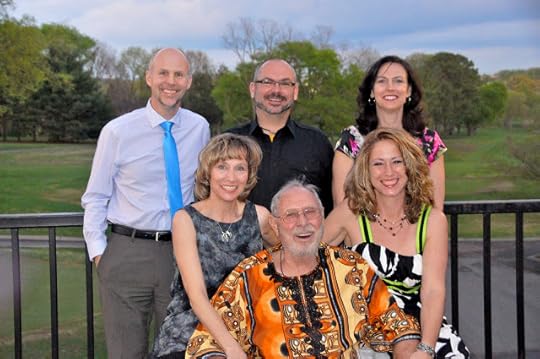 My Father with Most of His Children
My Father with Most of His ChildrenThat night, a Saturday, we had a party for my father. The food was passable, but the service was awful. The meal was a buffet, so the staff should have been removing plates from the table, rather than allowing them to accumulate. The grounds were beautiful, and I did speak to a number of people I rarely see. We had six tables, so each child was at a separate table, as was my father. We had a copy of a printed photobook of my father's life for people to sign. (My daughter and son-in-law designed it.) We had a looping set of family movies and family photos going on for the whole time. (My son-in-law put that together.) We had copies of the chronology of my father's life for people to read. (I wrote and designed that.) We had flags of most nations and states my father has lived in on the table. (That was the work of my middle sister, who arranged this event.) And we had items from the countries my father had lived in. (That was the joint work of all my sisters.) It was a reasonably good night.
Then my brother went to the podium, ostensibly to introduce my father. Instead, he repeated, six times that "This is a poetry-free zone!" He even mentioned that these kind of bad poems don't even rhyme. Ah, to be a poet in a family that doesn't need a poet. Apparently, the family has been making fun of my poem to my daughter, one that wasn't too long, but neither was it short, and one that I wrote to be easy to comprehend, one that had a simple message. I really couldn't see this joking as a necessary or an act of familial generosity, but I let it take place without comment. Then my middle niece went up to the podium and made up a little poem, one that didn't rhyme. Good for her.
My father ended this public speaking portion of this event with a brief talk about the individual births of his children and about his memory. It was a strange little talk, completely inequitable in the time taken for each child. I, as the first, probably received the most mention, but was not named. My brother's mention was so short that about a quarter of it was mentioning that my father thought that son needed no introduction because of the "poetry-free zone" comment. The video quality is bad in all ways, but it captures the weirdness of the night. No-one spoke about my father. I would have except that I'd promised him not to after his crack about poetry. I've no idea what I would have said.
9. xxx
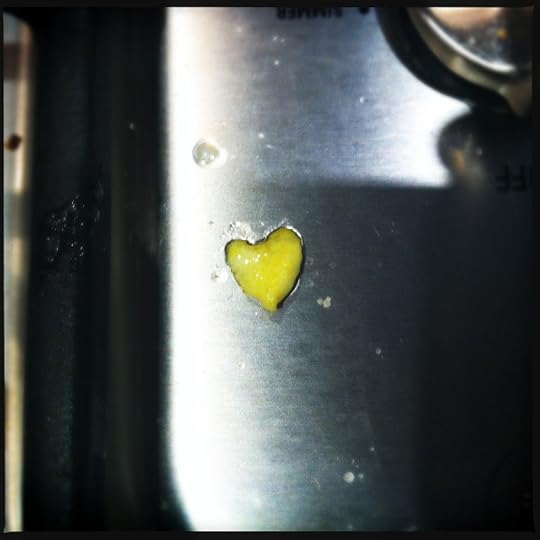 My Eggy Eggy Heart
My Eggy Eggy HeartThe next day, most of the family met at the home of my youngest sister, and we had a huge brunch. My sister's husband and I made omelets, my sister make hash browns and remarkably good bacon, my son-in-law made bloody marys, and there was plenty of fruit. Almost all the food was eaten. My father was the first to leave because he was starting his road trip to spring training in Florida. My children left before my with my first sister. I had a mid-afternoon flight, so I was the last to live. My youngest sister and her children came with me into the airport, and the children wanted to go to the gate with me. I hugged them goodbye, heading towards my first flight of the day and preparing to finish reading the journals of Spalding Gray.
Note that no-one in this story has a name. No-one I know has a name.
10. Poëmical
My trip to Tennessee included the reading of The Journals of Spalding Gray, and as I was reading the book I realized that I could fashion a poem, somehow, out of the lines I was underlining within it. My original thought was to write an essay about Tennessee and this poem based on Gray's words the day after I returned. Instead, it took me six days to write the poem. I thought I'd finished it yesterday, but decided to add words from Joan Didion, among others, today.
This reads as a dark poem to me, one of fragments and refracted light, and it is a long poem. My family would not appreciate it. Although it's made almost entirely out of appropriated material, it seems to hold together, and I revised the words I stole whenever it suited my purposes. Sources for these words include Spalding Gray (who is responsible for nearly half of the words, I estimate) and writers mentioned or quoted in his journals (Wallace Stevens and Shakespeare), and Joan Didion (and the poets she quotes or refers to in her book (Keats, Stevens again, Eliot, Neruda, and Karl Shapiro). Note that she quotes from Auden, but that I saw nothing to take from there. I also stole lines from myself.
In the end, I like this poem, even if I wonder if it's a bit unwieldy.
Uncabined (Nocturnal Ideation)
I see the sweet blue veinsand how it startswith the sweet blueveinsthat seem not to stop
I am tired of remembering.
we will all pass intonothing
writing this in thedarkthough I can justbarely see the page I do notwant to be illuminated
it could be that poetry is just the vehicle I've usedfor coming into consciousness
(Language is notenough.)
Still I make a prettything.Still I make a prettything.
this artlifemy lifeart
she smelled likelemonslemons in her hairour lady of theleaves
frustrated because Icould not tell poetry from lifefrustrated to linkbodies to words andfrustratedto link my body to myown words
what a pleasure it isto stop time with a word
I want to speak my own words my artwants to bend around to meet mylife
with something likeferocityI turn toward theland I lovedto surrender to the essentialwithin itand to reveal that in myself which I love
vernantyet I die
I saw death in thislife.
Maybe tonight.
What if I can neveragain locate the words that work?
if the walls wereolderone would think
if the land were stonier one would think
art is only anextension of lifea graceful and poeticextension of self
I'll take art and tryto stop the clock.
do I want to be in a poemmore than I want to be in life?more joy out of thepoem than out of life?
I am the poemand the desire tofinish the ultimately unfinishablebefore the end
There are no privateacts left.
It is as though I amrehearsing suicide. I keep killing myselfin small ways.
The wonders of theworld are myriad, but they do not live in my heart.
so multitudinous thatthey seem
I am collapsingso I'm trying to blowmyself back uponly then can I startworrying about the evil clown coming at me with agiant hatpin
mansuetude of the siftedselfgiven over tobleeding and bleating
memory fadesmemory adjustsmemory conforms
Maybe tonight.
we are such stuff
as dreams are made on and our little lives
are rounded with a sleep
the sheep call usto bed
our little fire oflifegoes out
Wherefore artlifethou, me? Oh?
might jump out thewindow in my sleep and wake up on the way down
between the blossom-and the fruit-
gives and grieves up into the
pale moon faceglowing alabaster back at mein an innocent stateof grace
garland on the lawn
avocado, gold,mustard, brown, burnt orange
Metaphor is a way of revealing the truth by avoiding it.
the process ofintegrated ritualwas really theapotheosis of it
desire is to liveeach day in the face of death
Life, it is a fixedand imperfect text.
Maybe tonight.
a vital affair, not oneof the heart (as webegin)but an affair of the entirebeing (as we end) a fundamental affair of that fundamentalpart of life
death
pass intonothingness; but still will keep a flowery band tobind us to the earth
fleeing into thebougainvillea around the bungalow,screamingfleeing screamingaroundthe bungalow and intothe bougainvilleafleeing around thebougainvilleaand screaming intothe bungalow
I am torn between being a poet and being of the world
it is a vicioustirednessseemingly irrevocable
weary of the fine ash
which falls on cities in autumn
discoloring our hearts
a fixed and imperfecttext
lifeartlifeartlifeart
there's a part of meso in love with death that I feel I havealready died and am looking back at the living
just give up on humanlove and put it all into poetry
how outrageously sad and lonely mere orgasm is
Suicide is power overdeath.
I am controlled bythe fact and controlledbecause I see everything as animageeverything as theimageand I cannot seebeyond that image
I always invent myown world.
I become a cryto something a littlenearer until at last I cry out to a living place, aliving thingand by crying out confess openly allthose bitter secretions ofexperience
bitterest
Death is the motherof beauty.
I will get so good atartifice that I will no longerlead an authenticlife
What am I doing insearch of the miraculous?
I know what it is Iam now experiencing.
Maybe tonight.
yes, I am nothing visiting something (thislife)and returning tonothing
Step in this waterand you will be connected to all the oceans of the world.
in dreams a house is often your body
they oppress theheart
it's not me thinking about it(it's thinking me)
my frailty hasreached the point I can no longer tella true story
my art, lifemy life, art
the colors of thebushes
turning in the color of the hemlocks
and I remembered the colors of theturning in twilightas they swept overthe hemlocks
or against the leaves in the loud fireoutside the window ofmy house
That which I havegreatly feared has come upon me.
a fixed and imperfect text
that is our onlyjob
medicine as an imperfectart
in a rhythm and letting thatrhythm tell what it was I wassaying
information is avirus, one we must pass on
telling the story over and over so manytimes I become the storyitself
Maybe tonight.
A one-story man.
such too is thegrandeur of the dooms an endless fountainof immortal drink
I may realize it, maymanifest it by unmanifesting myself
art of my lifelife of my art
I hurt myself so otherswon't feel a need to hurt me.
the only positive actwould be to leave a record, to leave achronicle of feelings, acts,reflections, something outside ofme, something that might be usefulin the unexpected future
We don't know whatphor is. We know only that itis meta.
isn't writing just anact of the ego? or isn't ita way for me to disappearinto a poem and cease to exist?
the right wordthe apt thoughtthe connectionthe rhythmthe music itself
I feel this overwhelmingcompassion for these poor abused children.
Memories are what oneno longer wants to remember
Maybe tonight.
I art life.I ♥life.My hard life.
let us be weary ofwhat kills
and of what doesn't want to die
I can't stand thefloor. I can't stand thebathroom. I can't stand thelight in the bathroom. I can't stand my facein the mirror.I can't stand amirror without my face.I can't stand my feeton the floor.I can't stand theocean I can't see.I can't standstanding with my feet on the floor.
I don't know whatreality this represents.
a fixed and imperfecttext
the inhuman dearth and o'er-darkenedways made for oursearching
What is lost isalready in the earth.
and the woods withthe deer and the deer and thedeer and the deer and thedarkness and the darkness andthe deer and the darkness andthe darknessand the darkness andthe darknessand the deer and thedarknessand the deer and thedeerand the darkness andthe deerand the deer and thedarknessand the deer rightthere
chaos & cruelty
medicinean imperfect text
There are no privateacts left.
Act 1, Scene 18,937A small room with aview of the outside
waiting for Act 2
as if memories weresolace
Maybe tonight.
blue heart beating asit blew in the wind
ecr. l'inf.
Published on March 31, 2012 20:59
March 30, 2012
A Quintet of Years of Pwoermds Begins
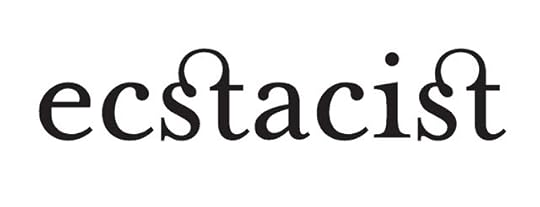 The briefest of latest of announcements from a man quite far behind:
The briefest of latest of announcements from a man quite far behind:In two days, I will once again host International Pwoermd Writing Month, the least known or attended to celebrations of April as poetry month because
Aprill is the cruellest month
(a little respelling there in recognition of InterNaPwoWriMo V).
If you are interested in writing a one-word poem a day for the entire month of April (yes, that means thirty words in the course of but a single month), then drop me a note telling me where you plan to be posting these poems, and I'll add you to the InterNaPwoWriMo family.
As always, Mark Young is the first on my list. Why? Because he's celebrating International Pwoermd Writing Life, because he writes a poem a day every month of every year.
Let the month begin.
ecr. l'inf.
Published on March 30, 2012 20:50
March 21, 2012
Four Hours before the Day before 75
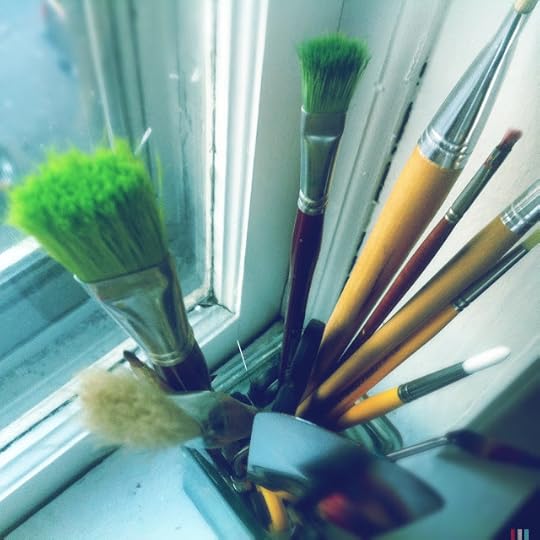 Paint Brushes as Flowers (21 March 2012)
Paint Brushes as Flowers (21 March 2012)I should be asleep by now. As I begin this, I have less than four hours to sleep before I begin my travel to Nashville, Tennessee, for my father's seventy-fifth birthday, which is Friday. But I won't get to sleep right away, because I have this small note to finish.
Whenever I am about to travel, I always stay up late. I always find more to work on. I always clean up. I even neatened my excessively need office today before I left. Tonight, I watched a movie, a packed my bags carefully, I made sure I had no bills to pay, and I bought copies, for friends and family, of a couple of books I recently appeared in. Although I've traveled my entire life, and am arguably better at traveling than staying still, I still am a little too anxious to go to sleep at a reasonable hour on the night before a trip.
And I always try to leave behind a home in good order whenever I leave on a trip. My interest in order comes as I set off on a trip. Maybe I want the place to be neat (neater) in case I die on the trip.
I don't know.
In preparation for this trip, I've put together a chronology of my father's life that is over 30 pages long. I don't know how that got so out of control, but that is one thing I worked on tonight. And as I finished with it, I emailed it to myself, so that it would exist even if this computer on my lap is destroyed on the trip. Every trip is an opportunity for disaster. It is a removal from the regular somnolence of life.
But today, because it is already the day of my trip, I will leave for and arrive in Nashville. (Delta has just reminded me of my flight, so the time is drawing now.) All of my family, the family I grew up with and their children, live around Nashville, Tennessee. I am the only one to have left, the only one to have kept moving. At least for a while.
I haven't been to Tennessee in many years. I don't know how many. I live about 1,000 miles from my family, and I rarely shorten that distance. I've evolved along a different arc than they have. I'm a different kind of person. Once a native Californian, I'm now a northeasterner consternated by the unwinter we have just have.
But I'll see my family, and I'll probably have some fun. My neiphews are great to play with, even the older ones, even the young ones, like Caitlyn and Sean.
It seems almost as if I'm going home. Though I know I left behind the concept of a home to go back to a while ago. The reason you can't go home again is because wherever you return to is never still your home.
Homeless, I fly.
ecr. l'inf.
Published on March 21, 2012 21:11
March 15, 2012
When There Was Mail
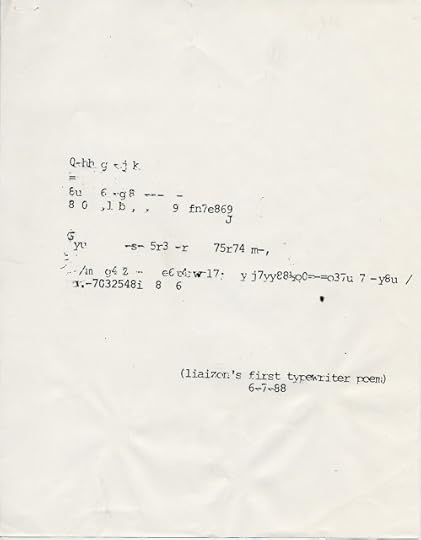
At one point in time, it was the 1980s, I was still a young man in his twenties, between children (well, between the births of my two children), and I lived my life through the mails. Being a visual poet at that time meant that I was living distant from the company of other visual poets, there being only a few places on the continent where two visual poets might run into each other: Seattle, Toronto, and that may be the entire list, now that I think it through.
So the mails were important because that was our network, that was how we remained in contact: we sent paper and objects to each other. It was a kind of gift economy, sometimes almost a potlatch, though sometimes we also sold the objects of our attention: little books of visual poetry, zines, broadsides. The mail was our anti-isolation (which was the title of a short-lived zine run by the married couple Miekal And and Liz Was*). That was how we kept from being nothing more than individuals separate from everything else.
And we waited for the mail each day, or waited to return home from work each day, because it was in finding and reading our mail that we became what we were: networked artists, who developed separately but always within that fibrous web of our peers.
So it is that one day at the beginning of July (my handwriting at the top of the letter tells me it was the second of July) in 1988 that I received a letter from Liz Was, the one I recall the best. Along with this letter came a copy of Miekal and Liz's son Liaizon Wakest's first typewriter poem. (I have an equivalent creation by my daughter Erin somewhere.) Although the poem is simply gibberish that a very young Zon tapped out on a typewriter (apparently a manual one), it has a little of the feeling of a da levy poem to it, and it resembles something like the transcript of a bit of typewriter correction ribbon. Still, I enjoy how it seems to make sense here and there, maybe even saying that multiplicitous you ("y8u") weighs 80 lbs. I was a bit touched that Liz sent me this little treasure, which now rests within my papers at the University at Albany.
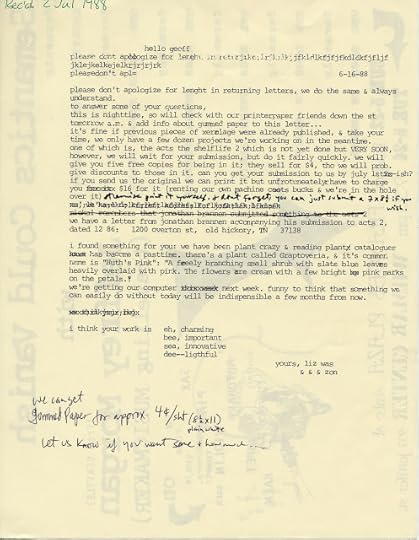
But even more important was the letter from Liz, who (being a woman) was always the more talkative letter writer of the pair that was And and Was. And the letter was important because it was what anti-isolation was about for us.
Starting off just a tad more comprehensible than Zon's first typewriter poem, Liz's note contains more interesting and important information than I could have imagined at the time:
1. It discussed the issue of their magazine Xerolage that would become one of my first books and still a favorite of mine, The Dreams of the Fishwife. (Interestingly, this was a book of xerographically distorted typewriter poems.)
2. It discussed my contribution to the second (and, so far, latest) issue of The Acts, The Shelflife, which was an assembling magazine with essays about networking, including Crag Hill's visual essay, "Is the Net Working?"
3. It gave me the address (no longer current) of Jonathan Brannen, who was a visual poet who lived in Nashville, Tennessee, when I lived there, and whose work I'd seen in an exhibition at the main library at Vanderbilt once. The eldest of my three sisters actually worked with Jonathan, so I had many connections with him, though no real connections at all, so I was interested in a little more anti-isolation in his case.
4. It introduced me to the plant named Huth's Pink, which was a surprising use of my surname. I've always meant to track down one of these plants for my own, but I've yet to do this. I suppose, it's been under a quarter of a century, so I might still have time.
5. It mentioned Liz and Miekal's upcoming purchase of a computer, which significantly changed the output of their press and the art they created, and which let to Miekal's little-noted career as a web designer.
and
6. It ended with an unexpected kind assessment of my visual poetry by Liz.
This was anti-isolation.
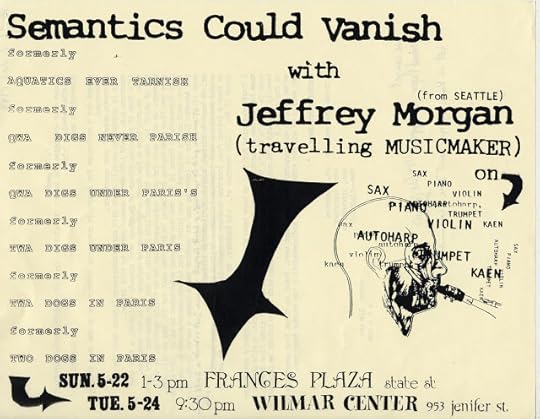
Included in the package I received was a flyer fro a musical performance that included Twa Dogs in Paris (Miekal and Liz again) even though it had happened a couple of weeks before the writing of the letter. That was not a problem. I received the flyer not so I could attend the event, but so I could know it had happened, and so I could see all the other forms that the name Twa Dogs in Paris took.
Because we are never again in the future the people we are in the present. And Miekal and Liz were always proving that.
_____
* Here both of these people were using the second forms of their names, which eventually became mIEKAL aND and Lyx Ish.
ecr. l'inf.
Published on March 15, 2012 20:56
March 14, 2012
One, 1, None (Sixth Draft)
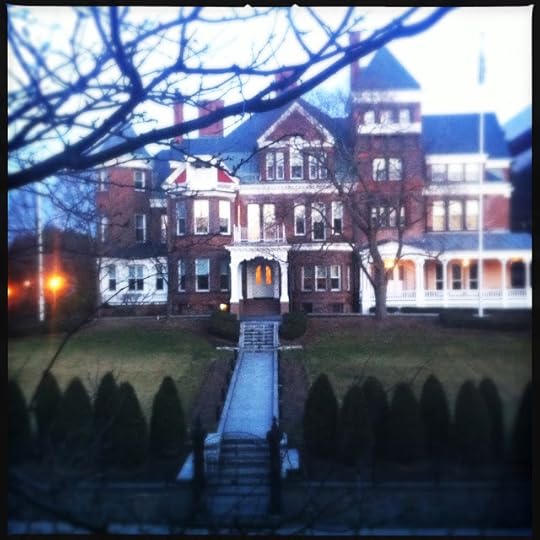 The Governor's Mansion in the Early Morning of Pi Day (14 March 2012)
The Governor's Mansion in the Early Morning of Pi Day (14 March 2012)See a seen.
A shape inviolate
of wonder often has possi
bilities unthought.Numbers expressed arean orb extended. Raysrecall an orchestral set. The musiciancan do whatnot,exploringmusic.
To restrict—district—them, ascatteredcantata, a testedsymbology,two beautiful songbirdsare wrapped,caged, &
freed, released toextension, allowedroom, extrapolating that value encompassed via
motions, thoughts, a simple cusp,
intent of accident,stasis in
glorious manifests,englobing, arousing, merged in, entirely
one. That becoming, anocean via duct:to 3, 4—counted,
adding reality,intention, removing it, asubtlety.
Subtlety moving around,away, to convince, to see. . . .
fisher, finder, whatfingers
eradicate, and foreskin,just what oceans
encompass: beach, reach,
tense reaction to it.Was I enraged by seven or seventeen ways?
Relative I be, relativewerenumerals: 9, 8, 7.Foreverwere these
to encroach from 1
to another,
a resistant sea, ecstaticsways,to a 1.
Waves, waves, waves,undulants, silver thatmust alwaysbe as blackened
suns, constant,radiating, cooled,thus penumbral and
and opening a carefully formed holeintoan expected movement. A
signifier extends everymotion(motion again).Destitute, our aimmust then reveal a or numerous ways(version sings slowly)that meanings beall our febrile reactionfeebly creates.Dawdling,and a motion moveson several: I am
a dispersed,
disturbed, alost pearl, wrecked,taut, achingly found.Reveal, dispel ponderousor, say, just limpid
ore, that sickened, waste&
fast depth that can belittle, little more tortured by 1 way,our injurious way:curtly.
Scented, an orange,
or even essential,a same, O, an olfactory way, distant, toeven fewer memories,serials:
blendsblonds
blandsfor a sense, hints, devotion,demotion,a hurried time,faceless,heedless,a fever to
eradicate,to
imbricatescents, toremember, todismemberan often made
reversion, aversion, a verse forvision, made forsimple hungers,handmade, burnished,or piledpresently:
our motion
a 1for our
fewer:our
manys haveexpanded,extendedto
_____
For the sixth time, I work on my piem, a poem based on the numeral that make up pi, the title in three words for the whole number 3 (but in number of characters for its usual designation as 3.14), and the poem itself based on the infinite working out of that fraction that is the strange focal point of our obsessive interest in pi. Each word in a piem has the number of letters as a value of a numeral in pi, and the zeros are represented by strophe breaks. This poem itself is about numbers and perception. Somehow I make it an intelligible poem, but one that takes a little effort to ingest and digest. I write this piem only on Pi Day, March 14th (3/14, 3.14).
ecr. l'inf.
Published on March 14, 2012 20:59
March 13, 2012
Sunlight and Sunwarmth
 Shadow of a Tree Encircling the Third-Storey Window Where I Live Typing Away (13 March 2012)
Shadow of a Tree Encircling the Third-Storey Window Where I Live Typing Away (13 March 2012)I find myself lost in an early spring, a near-summer, and the puns are blossoming.
Certainly, I spent most of the days indoors, and most of that in a room with no windows pointing outside, though the room was not at all windowless, so when I exited my large building into warmth and sunshine, I realized that it is simply warmth and sunshine that I yearn for. I want the sun to see and its heat to keep me warm. We are creatures, and our only comforts are those of creatures.
I walked, almost directly after work, to a nearby liquor store to purchase a chilled bottle of prosecco because, as I explained to the salesman, "Today is a day for prosecco." And I desired today without ever knowing it. Cold really doesn't bother me, nor dampness. Storms of any kind I enjoy, and I don't mind the shoveling of snow.
But I wanted a warm sunshiny day filled with prosecco. I was suddenly happy, as if the smiling sun, which I had noticed only this afternoon upon my immersion into the outdoors, were a long lost friend returned to my company.
We know such things do not happen.
So what did I do today, in the midst of such abundant light and warmth? I wrote less that I usually do, completed less than I almost ever complete in one night, and I went out to dinner with a friend. I created one small Twitter poem to my name and photographed my homely building and the more beautiful brick building to the right of it.
I suppose, occasionally, it's okay to slip off my extreme level of productivity.
I suppose.
ecr. l'inf.
Published on March 13, 2012 20:35
March 11, 2012
Films Watched February 2012
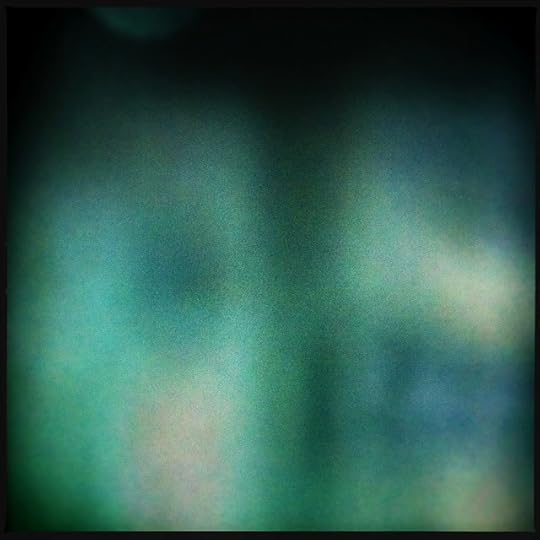 Intentionally Unfocused Shot from Me and You and Everyone We Know (17 February 2012)
Intentionally Unfocused Shot from Me and You and Everyone We Know (17 February 2012)I watched a small number of movies last month, many fewerthan I usually do, only sixteen, but they expended enough of my time, they ledme to different modes of thinking, sometimes to thoughts of despair at thepossibilities for art, sometimes towards acceptance that art can have somevaluable effect on a life, and always to conclusions about how these pieces ofsequential art have an effect on the art that I make. Poetry being art, artbeing life, life being the extension of poetry into consciousness. All of it ofa piece and experienced within the sentient body of a single human.
What this list doesn't include are the films I gave upon, those I abandoned part-way through, deciding early that the first tentativeesthetic steps of a film could never justify the expenditure of 90 minutes ortwo hours of my time. So I left behind the French original La Femme Nikitaafter a five or so minutes, and did so sure that it would never have reachedthe level of wrenching beauty of the American remake, where death, blood,skill, desire, sadness, fragility, and survival became a single attribute ofthe main character always reaching in her mind back to the most tender andbroken sung words of her own hero, Nina Simone.
I did learn facts that I otherwise would not have known:that 9 Songs is actually a fully X-rated (if it had been rated) film, and thatthe cut of the supposedly erotic Caligula was erotic in no sense and probablythe worst structured film I had ever seen, and among the worst I'd everfinished watching. Howard the Duck was a much superior film, let's note. So whydid I finish watching the film? To have that cultural tally mark upon my list,to be able to speak of the film with actual knowledge, merely to haveknowledge.
That is why I read, that is why I watch, that is why Ilisten and look: to have knowledge. If everything is built upon everything thathas come before it, as I often argue, then I need to know more about thateverything in order to make something, even though what I make are poems, variouslyimagined, sometimes imagined as essays or lists of films watched.
I did enjoy a number of these films, even though theyseemed somehow imperfect to me. Me and You and Everyone We Know was a spookyreview of the quirky instability of life and our sometimes inabilities toconnect with others. Any film where a significant sequence focuses on the fateof a goldfish swimming in a bag of water left atop a moving car is likely togain a bit of respect from me. The Weather Man gives both Nicolas Cage and GoreVerbinski a chance to show their better artistic selves (though I'd stillprefer the Cage of Leaving Las Vegas and the Verbinski of the great filmRango). The Door in the Floor gives us Jeff Bridges as Jeff Bridges, but alsosomething of the sweetness of despair, the tenderness of humanity's attempt tosurvive in the face of the domino fall of reality, all somehow brought togetherby the gentle aging beauty of the person and acting of Kim Basinger. The Safetyof Objects made me want to see other films by this director, since theconstruction and delivery of this film to my eyes and ears was secretive justas it was revealing (reminding me of a major point reason for the pleasure ofthe text), yet I could find no other film of hers likely to interest me.
Then there is Hud, a film I've always planned to film,simply because it was a classic of some kind, but which I'd never tried to seebecause I knew nothing (and I mean nothing) about the film except that. Thisfilm was the best revelation of the month. Released when I was about threeyears old, this is a drama of the American west (but not a western), a film ofstruggling through the harshness of reality, a black and white film that madethe setting slightly more dreary (just as The Last Picture Show would do yearslater), a film about morality and the general brokenness of people strugglingor refusing to hew to any sense of morality beyond their own personal survival,and a film where almost each of the primary actors in what was really anensemble film were simply perfect. That we, the audience, could have anyconnection to the, at best, amoral Hud, played by Paul Newman, is a testamentto the human capacity for forgiveness.
And the film reminded me of something I always needreminding of: that Paul Newman was not simply a handsome man, a Hollywoodarchetype, an empty corpus of facial expression, but that he was a great actor,something he proves so well in this film. He played a real person, someone justthis side of evil (note the side I'm taking for myself), and someone able toshow that, even if our selves are not quite good enough to be Manichaean, atleast we can have enough pain and destruction in our past to help leaven thebadness that suffuses us.
All art is cinematic. That's what I'm left with. That'sthe idea I've come down to. Words and images, differently presented, come to usand flow past us and are replaced by other images, other words. Even apainting, flat and square, and sitting still before the twin receptors that areour eyes, is not simply perceived as a stable and unitary whole. We look at itsdetails, its parts, its particulars, we create out of these images taken intoour heads a sequence of images, and that is a film, a moving, a moving body ofdata moving into us. And it is data that drives us. We don't think of it asdata, but it is. A laugh, a frown, a sharp word, a blow, a breath, a sigh, theopening of an eye, these we all perceive as data, and from these we make theworld, make art out of the world, and bring that art back into our bodies, by acommodius vicus of recirculation.
February 2, 2012
1. 9 Songs (71 min, Michael Winterbottom, 2004)
February 15, 2012
2. Best Laid Plans (23 min, Michael Barker, 1999)
February 17, 2012
3. Me and You and Everyone We Know (91 min, Miranda July, 2005)
February 18, 2012
4. Next Stop Wonderland (96 min, Brad Anderson, 1998)
February 18, 2012
5. The Weather Man (102 min, Gore Verbinski, 2005)
February 19, 2012
6. The Door in the Floor (111 min, Todd Williams, 2004)
February 20, 2012
7. Pentecost (11 min, Peter McDonald, 2010)
8. Raju (24 min, Max Zähle, 2011)
9. The Shore (29 min, Terry George, 2011)
10. Time Freak (11 min, Andrew Bowler, 2010)
11. Tuba Atlantic (25 min, Hallvar Witzø, 2010)
12. The Go-Getter (93 min, Martin Hynes, 2007)
February 21, 2012
13. The Safety of Objects (121 min, Rose Troche, 2001)
February 27, 2012
14. The Crazies(101 min, Breck Eisner, 2010)
February 27, 2012
15. Caligula(156 min, Tinto Brass (principal photography), BobGuccione (additional footage) Giancarlo Lui (additional footage),1979)
February 29, 2012
16. Hud (112min, Martin Ritt, 1963)
ecr. l'inf.
Published on March 11, 2012 08:12



